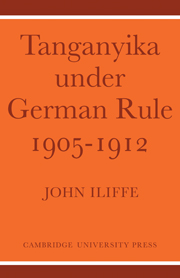Book contents
- Frontmatter
- Contents
- Preface
- Terminology
- Abbreviations
- Glossary
- Map of Tanganyika in 1912
- 1 The argument
- 2 The Maji Maji rebellion
- 3 The political context
- 4 Rechenberg and reconstruction
- 5 The European challenge
- 6 White man's country
- 7 The collapse of the local compromise
- 8 The age of improvement
- 9 The new dilemma
- Bibliography
- Index
5 - The European challenge
Published online by Cambridge University Press: 04 August 2010
- Frontmatter
- Contents
- Preface
- Terminology
- Abbreviations
- Glossary
- Map of Tanganyika in 1912
- 1 The argument
- 2 The Maji Maji rebellion
- 3 The political context
- 4 Rechenberg and reconstruction
- 5 The European challenge
- 6 White man's country
- 7 The collapse of the local compromise
- 8 The age of improvement
- 9 The new dilemma
- Bibliography
- Index
Summary
Soon after Dernburg left East Africa in October 1907, Rechenberg followed him to Germany. Together they hoped to persuade the Reichstag to accept the new vision of German East Africa's future. But they left behind a frightened and offended European community, which was first to oppose and ultimately to reverse the Nyamwezi and peanut policy.
The community was small. Of the 2,772 Europeans in Tanganyika at the end of 1907, 319 were officials, 168 soldiers and 303 missionaries. Although these groups cannot be completely discounted, the effective political element was thus reduced to 1,982, Of these, 479 were male settlers and planters; some 70 per cent were Germans. Their primary political motivation was fear, both for their interests and for their physical security. The fear was reasonable. Europeans who had suffered in the recent rebellion were paid only 30 per cent compensation, and that after four years’ delay. Their leaders asked pertinent questions about the lack of military preparedness which the rising had revealed, and demanded with little success that a white volunteer force be formed and trained to use machine-guns. Of all Rechenberg's actions, that which most alarmed the settlers was his decision, on grounds of economy, to reduce the number of European personnel in the defence force. European politics in German East Africa are comprehensible only against this background of insecurity.
- Type
- Chapter
- Information
- Tanganyika Under German Rule 1905–1912 , pp. 82 - 117Publisher: Cambridge University PressPrint publication year: 1969



